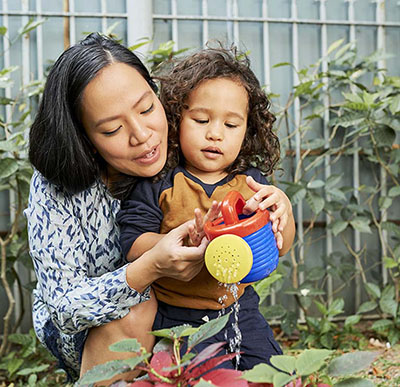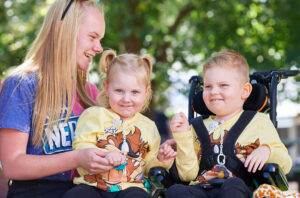
Accessing NDIS support for children aged 0 to 8
If your child is developing differently compared with other children, or if your child has a disability, they may be able to get help from the NDIS.
The NDIS provides funding that can pay for therapy and equipment to support you to help your child’s development.
The Early Childhood Approach is part of the NDIS. It is specifically for younger children.
The NDIS Early Childhood Approach is a free service.
Can my child get help?
The NDIS Early Childhood Approach helps children aged 0 to 8 with developmental delays and disability.
Children aged 0 to 5 do not need a diagnosis to get support.
Children aged 6 and older with developmental delay need a diagnosis to get or continue getting an NDIS plan.
If your child is aged 6 to 8 and has developmental delays but does not have a diagnosis you can get help with early connections and support.
Young children in Victoria who are not citizens or permanent residents are eligible for help from birth to when they start school.
If you are not sure if you can get help it is a good idea to contact your Early Childhood Partner.
How does my child get help?
The journey of identifying that your child has a disability and getting a diagnosis can be an emotional roller-coaster.
Finding out about your child’s development or disability is different for every family.
If your child is not already seeing a paediatrician, you can see your GP or a Maternal Child Health Nurse.
Your GP, Maternal Child Health Nurse or paediatrician can refer your child to your closest NDIS Early Childhood Partner or you can contact them yourself.

What the Early Childhood Partner will do
1. Get information about your child
The Early Childhood Partner will talk to you and gather information about your child. They will observe your child. They might do an assessment which involves asking you some questions. They will ask health care professionals who know your child for more information about your child’s development or disability.
2. Talk to you about supporting your child’s development
The Early Childhood Partner will talk to you about how you can support your child’s development at home.
3. Help you work out the next steps
The Early Childhood Partner will work out with you the best option for your child. There are a number of options: Early connections and support or an NDIS Plan. The best option depends on the severity of your child’s developmental delay or disability.
Option 1: Early connections and support
The Early Childhood Partner can provide parent training, help setting up routines, help building your child’s skills, connections to local playgroups that will help you and your child.
Option 2: An NDIS Plan for your child
An NDIS Plan is for children who have a substantial delay across one or more areas of development. Children who have a diagnosed significant and permanent disability can also get an NDIS Plan.
The Early Childhood Partner will work out whether your child is likely to meet the NDIS eligibility criteria and may recommend that you apply for an NDIS Plan on your child’s behalf.
If you decide to apply for an NDIS Plan, your Early Childhood Partner will help you through the application process.
An application to the NDIS is made through an access request. The Early Childhood Partner will complete the Access Request Form. You must provide evidence of your child’s developmental delay or disability with the Access Request Form. The Early Childhood Partner will help you get the right evidence.
When the NDIS receives your completed access request it will be reviewed against the NDIS Act. The NDIS Act is the law that guides the NDIS and states who can get NDIS support.
You may be asked to provide additional evidence to help the NDIS make their decision.
You will be told in writing if your child’s NDIS Access Request has been successful or not.
Getting an NDIS Plan for your child
If your child gets access to the NDIS, the next step is a meeting with the Early Childhood Partner to talk about what support your child and family needs. This is called an NDIS planning meeting.
After the planning meeting you will get a copy of your child’s NDIS Plan. It will include how much NDIS funding is in the Plan and what you can spend it on. Generally, you can use your child’s NDIS Plan to pay for therapy, equipment and support for your family.
Appealing or re-applying if your child does not get access to the NDIS
If your child does not get access to the NDIS and you disagree, you can ask for an internal review of the NDIS decision. If that is unsuccessful you can apply to the Administrative Appeals Tribunal for a review.
Re-applying to the NDIS
Access decisions are based on the current impact of your child’s disability or developmental delay. The impact of your child’s disability can change over time because of a degenerative disability or a deterioration in their day-to-day function. If the impact of your child’s disability has changed and your access request was more than three months ago, you can make a new request. Make sure you include new evidence.
NDIS terms explained
Disability
A permanent physical or mental condition that limits a person’s movements, senses, activities or how they interact with their environment. The NDIS uses the definition of disability in The Disability Act 1992.
Developmental concern
When there is at least one area of development (such as talking) that is delayed but it is not as severe as developmental delay.
Developmental delay
When a child is not developing physical, social or language skills as expected for their age. The NDIS has detailed criteria for developmental delay.
Early connections and support
This is a free service provided by your local Early Childhood Partner. They provide parent training, help setting up routines, help building your child’s skills, connections to local playgroups that will help you and your child. They can also help you apply for the NDIS for your child.
Early childhood intervention
Therapy, equipment and education that can help families support their child’s development.
Early Childhood Partner
Organisations in your local community that meet with you and help work out what support your child and family needs. They can provide free services and they help you apply for an NDIS plan if that is what your child needs.
NDIS Provider
A registered organisation or person who provides services or supports to people who use the NDIS.
Useful links
Offices and contacts in your area
The early childhood approach for children younger than 9
What if my child has just been diagnosed with a hearing loss?
How to request an internal review of a decision
Support for young children who are not Citizens



